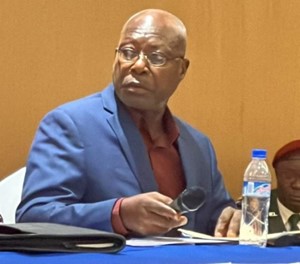Professor Alaric K. Tokpa, Acting Chairperson of Liberia’s Governance Commission, has issued a stark warning: illegal firearms must be removed from the hands of unauthorized individuals to safeguard the nation’s fragile peace and stability. This call to action, delivered during the commemoration of the Accra Comprehensive Peace Agreement, underscores the persistent threat posed by the circulation of weapons within the country. The presence of these arms, Tokpa argues, directly fuels the ongoing wave of armed robberies and criminal activities, jeopardizing the hard-won peace Liberia has achieved since the end of its civil conflicts. He emphasizes the critical link between disarmament and the broader processes of reintegration and rehabilitation, noting that while significant demobilization efforts have been undertaken, the continued prevalence of armed crime signifies a critical gap in securing lasting peace.
Tokpa highlights the complex interplay of factors contributing to the current security challenges. He points to the significant internal displacement that occurred during the war years, resulting in a mass migration from rural areas to urban centers, particularly Monrovia. This influx strained existing resources and infrastructure, creating an environment ripe for criminal activity. Many of those displaced lacked established family or community ties in their new locations, finding solace and connection primarily with former comrades-in-arms. This informal network, coupled with limited economic opportunities and a lack of adequate reintegration programs, often led individuals down the path of crime as a means of survival. The challenge is further exacerbated by a high unemployment rate, especially among youth, and limited access to education and vocational training.
The Acting Chairperson acknowledges the strides Liberia has made in maintaining peace since the Accra Agreement, attributing the progress to the concerted and collaborative efforts of various stakeholders, including local communities, policymakers, and academics. However, he stresses the need for continued vigilance and proactive engagement to address the remaining challenges. He advocates for a comprehensive and inclusive approach, emphasizing the importance of identifying and understanding the root causes of instability and developing targeted strategies to mitigate them. Tokpa advocates for robust engagement between the government, the private sector, and the local population to create a more sustainable peace.
Tokpa emphasizes the vital role of economic development, particularly in rural areas, as a critical component of long-term stability. He calls for strategic investments in infrastructure, including roads, electricity, and water systems, to stimulate economic growth and reverse the trend of rural-urban migration. He also highlights the importance of strengthening the agricultural sector, suggesting that public-private partnerships could be instrumental in creating opportunities and driving economic diversification. This, he argues, would provide alternative livelihoods and reduce reliance on illicit activities for survival.
He underscores the importance of creating an enabling environment for the private sector to thrive, arguing that this is the most effective way to generate employment opportunities, particularly for the large youth population. Tokpa notes that while the government has a responsibility to facilitate job creation, the private sector is ultimately the engine of economic growth. He emphasizes the need to channel the energy and potential of Liberia’s youth into productive endeavors, suggesting that by empowering this demographic, the entire country can benefit from increased social and economic prosperity.
Tokpa concludes by advocating for a multi-pronged approach to addressing the root causes of crime and instability. He emphasizes the urgent need to prioritize technical and vocational education, alongside formal education, to equip young people with the skills they need to compete in the job market. He also stresses the importance of providing reorientation and rehabilitation services for former combatants and other vulnerable populations, offering them a pathway to reintegrate into civilian life. Ultimately, Tokpa argues, a comprehensive strategy that addresses both the security and socio-economic dimensions of the challenge is essential to ensuring lasting peace and stability in Liberia. He emphasizes the need for a more inclusive understanding of the factors driving individuals towards crime, stressing that many are victims of circumstance forced to resort to illegal activities to survive. By creating opportunities for education, employment, and economic empowerment, Tokpa believes Liberia can break the cycle of violence and build a more secure and prosperous future for all its citizens.


